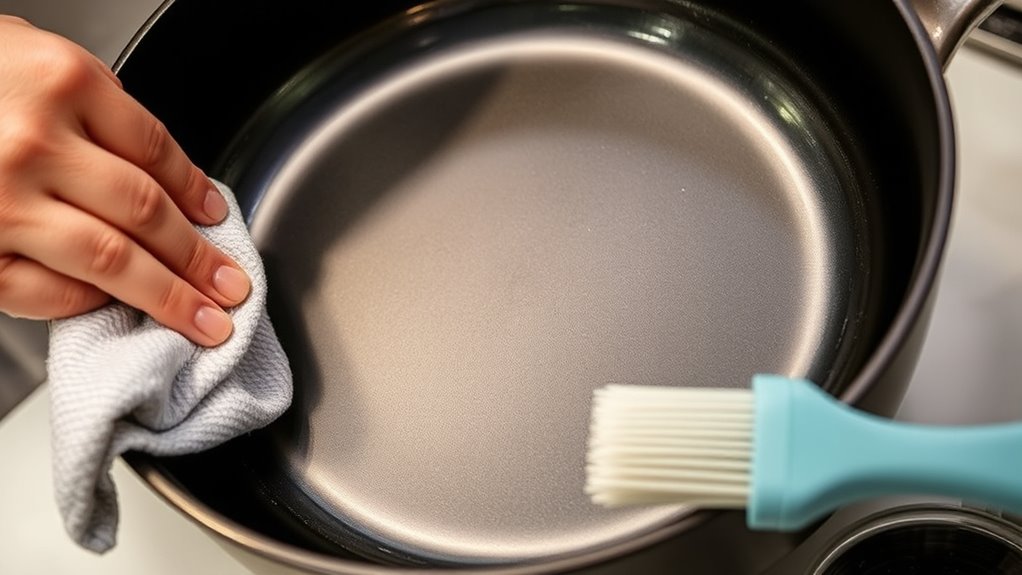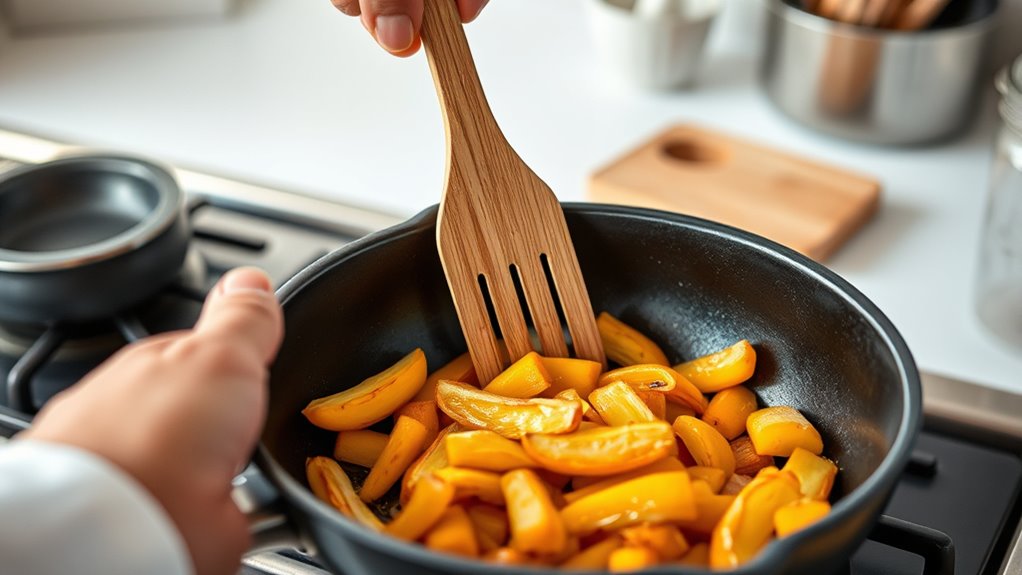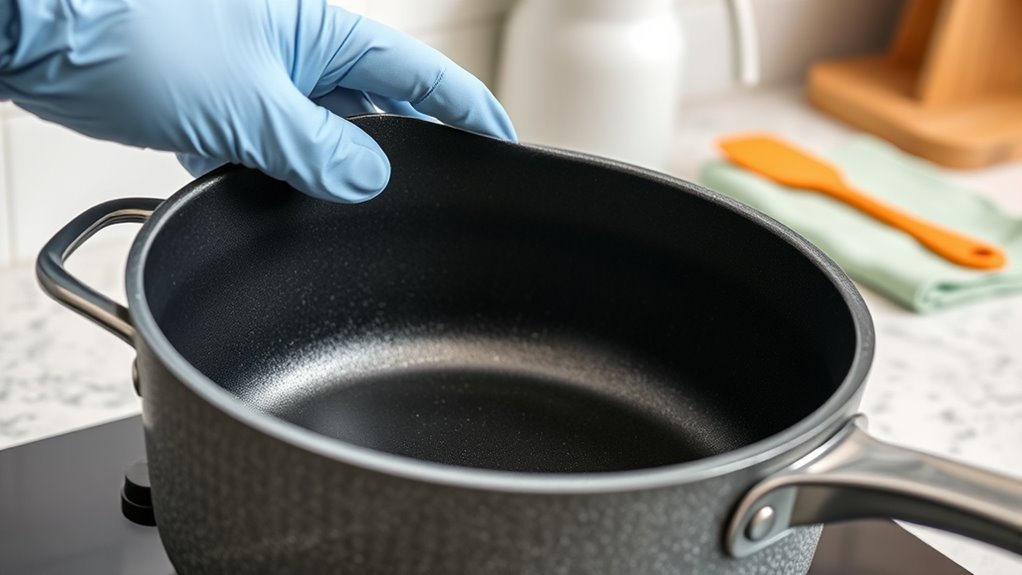To break in your non-stick basket, start by cleaning it thoroughly with warm water and a gentle soap, then dry completely. Lightly coat the basket with oil and heat it briefly to establish a natural non-stick layer. Avoid harsh scrubbers or metal utensils to prevent damage. Re-season regularly to maintain its non-stick properties and always handle with care. For more expert tips on proper care and longevity, keep exploring ways to optimize your routine.
Key Takeaways
- Do season the basket lightly with oil and heat it to establish a natural non-stick layer.
- Don’t use harsh abrasives or metal utensils that can damage the non-stick surface.
- Do clean the basket promptly with warm water and a soft sponge, avoiding abrasive scrubbers.
- Don’t skip regular re-seasoning to maintain and reinforce the non-stick coating.
- Do store the basket in a dry, well-ventilated area, preferably stacked with paper towels to prevent damage.
Proper Cleaning and Preparation Before Use

Before using your non-stick basket for the first time, it’s important to clean it thoroughly to remove any manufacturing residues or dust. Use gentle cleaning tips like warm water and mild soap, avoiding harsh abrasives that could damage the surface. Once clean, you can start with seasoning techniques to enhance its non-stick properties, such as lightly coating it with a bit of oil and heating it briefly. This helps create a natural non-stick layer and improves performance. Always confirm the basket is completely dry before using it for cooking. Proper cleaning and preparation not only extend the lifespan of your basket but also guarantee ideal cooking results. Additionally, understanding the importance of toilet maintenance can help you maintain your kitchen equipment more effectively and prevent issues. Regularly inspecting your tools and keeping them in good condition aligns with the principles of vibrational energy maintenance, which can positively influence your cooking experience. Implementing proper custodian services for your non-stick cookware ensures longevity and safety. Paying attention to the essential oils used in cleaning or seasoning can also enhance the non-stick properties and overall care. Follow these simple steps to give your non-stick basket the best start.
Best Practices for Cooking and Maintenance

Once your non-stick basket is properly cleaned and seasoned, maintaining its condition during use is key to ensuring long-lasting performance. To do this, follow good practices for cooking and maintenance. Use gentle utensils to avoid scratching the surface, and always preheat your basket gradually. After cooking, clean it with warm water and a soft sponge—avoid abrasive scrubbers. Incorporate seasoning techniques regularly to reinforce the non-stick layer. When not in use, store your basket in a dry, well-ventilated spot, ideally stacked with a paper towel to prevent scratches. Proper maintenance practices can extend the lifespan of your non-stick basket and keep it performing optimally. Here are some tips to keep in mind:
- Avoid metal utensils during cooking
- Regularly re-season with a light oil coating
- Clean promptly after each use
- Store in a dry, protected area
- Use appropriate seasoning techniques for longevity
Additionally, understanding non-stick surface properties can help prevent damage and ensure effective use. Regular inspection of the air purifiers’ filters can also help maintain their performance and prolong their lifespan. Proper cleaning methods are essential to avoid degrading the non-stick coating over time.
Frequently Asked Questions
Can I Use Metal Utensils on My Non-Stick Basket?
You shouldn’t use metal utensils on your non-stick basket because metal utensil risks damaging the non-stick coating. Scratching or gouging the surface can compromise its durability, causing it to peel or flake over time. Instead, opt for wooden, silicone, or plastic tools, which are gentle and help preserve the non-stick coating’s effectiveness. This simple switch extends the life of your basket and keeps it performing like new longer.
How Often Should I Replace My Non-Stick Basket?
You should replace your non-stick basket when cleaning tips no longer restore its non-stick surface or if it shows significant wear or damage. Typically, replacement intervals depend on usage, but generally, you might need a new basket every 1-2 years. Regularly inspect for scratches or peeling, and don’t forget to follow proper cleaning tips to extend its lifespan. When these signs appear, it’s time for a replacement to guarantee peak performance.
Is It Safe to Use Non-Stick Sprays?
Using non-stick sprays can be risky because they often contain additives that may damage certain non-stick coating types over time. Instead, you should consider cooking oil alternatives like olive oil or butter to guarantee safety and longevity of your non-stick basket. This approach helps protect the non-stick coating, preventing damage and ensuring your basket stays in good condition longer. Always check your basket’s specific care instructions for the best results.
Can I Put My Non-Stick Basket in the Dishwasher?
Have you wondered if dishwasher safety applies to your non-stick basket? While some baskets are dishwasher safe, many aren’t designed to withstand the high heat and harsh detergents, risking damage to the non-stick coating. For proper basket cleaning, hand washing with gentle soap is usually best. Check your manufacturer’s instructions first, as this guarantees you don’t inadvertently ruin your non-stick basket through improper dishwasher use.
What Are Signs That My Non-Stick Coating Is Deteriorating?
If you’re wondering about signs that your non-stick coating is deteriorating, look for non-stick scratches or coating peeling. These indicate that the surface’s integrity is compromised, and it may no longer perform well. You might also notice food sticking more often or difficulty cleaning the basket. When these signs appear, it’s time to contemplate replacing it to ensure safe and efficient cooking.
Conclusion
To keep your non-stick basket shining like new, treat it with gentle care and regular maintenance. Think of it as tending to a delicate garden—you nurture it, avoid harsh tools, and clean it carefully. With proper cleaning and mindful use, your basket will serve you well, like a loyal friend in the kitchen. Remember, a little love goes a long way—protect your non-stick basket, and it’ll reward you with perfect results every time.









